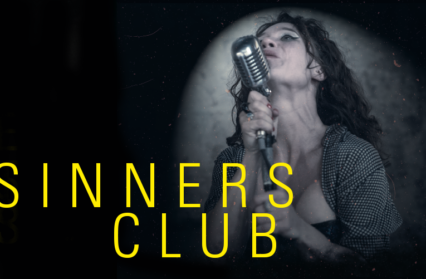If you’ve ever wondered what it is like to be inside a concept album Sinners Club is probably the closest you can get. Gagglebabble return after the success with Wonderman, this time to The Other Room in a co-production with Theatr Clwyd. With more similarity to 2013’s The Bloody Ballad, again love and murder and placing a woman at centre stage in both performance and narrative are all present. In Sinners Club the band, The Bad Mothers, are weaving the tale of Ruth Ellis, last woman to be hanged, while also working out some issues of their own. They invite the audience into their live studio recording of their new album to tell Ruth’s story – plus, as star and song-writer Lucy Rivers teases at the start, ‘a little something extra just for you’.
The audience certainly do get something extra, being more a part of the show than perhaps many bargained for. The term ‘immersive’ is thrown at every other theatrical production it seems, but Sinners Club truly does create a world that the audience is an integral part of, without feeling forced or artificial. Audience participation is also something that seems to be omnipresent – and something that can be a painful experience for all involved. In Sinners Club, however, the audience feel from the start that they are at The Sinners Club, watching The Bad Mothers record their album, so when Rivers proffers a leg for you to pull a boot off, or gives you an instrument to hold it feels natural.
In terms of performance Sinners Club is faultless. From the moment you enter the smoky, low lit recording studio that The Other Room has transformed into, from the first note that Lucy Rivers belts out to the last. Everything about the experience director Titas Halder has created truly brings the audience into the world. Halder has helped the band create a performance that is dynamic, with energy that pulls in and whips along the audience with the increasingly frantic energy of the band.
The musical element of the show is of the high standard those familiar with the work of Gagglebabble have now come to expect. Writer/composer Lucy Rivers leads Dan Messore (Guitar) Aidan Thorne (Bass) and Tom Cottle (Drums) across 90 minutes of music that would give long established bands a run for their money. As a gig experience it outstripped many a night at Clwb Ifor Bach. Rivers performance is both mesmerising and intriguing. On one hand, she delivers the musical elements of the performance with skill, while simultaneously delivering the emotional undercurrent and performance of the theatre within the gig.
The question of what is the emotional undercurrent, (or more accurately what is beneath the music), is a difficult question to answer, and one element in which Sinners Club falls short. Drawing on the story of Ruth Ellis, whose images look down from the walls of the studio, as if watching the performance of her life unfold, her story feels unresolved. In one respect the blurring of lines between Ruth’s story, the band’s story and perhaps some wider reflections on life, can remain obtuse. However, early in the performance Rivers sets out clearly Ellis’ story as integral to what the band (and we assume the show as a whole) is setting out to do. This element becomes lost fairly quickly, and references to Ellis’ story become more elliptical. And although Rivers wrote the music which accompanies, and theoretically tells the story, there is little for the audience to grasp onto to tie the elements together. While it’s not necessary to spell out the story, the audience needs a little more to go on at times.
This is in part linked to the nature of the performance; Gagglebabble are creating a new kind of theatrical experience with their ‘Gig Theatre’. It’s a brave, innovative and a fascinating idea and experience. However, it is an idea that feels like it’s still developing. In form, existing in a space between a play and a musical theatre/plays with music. It’s a new format that needs perhaps to continue to borrow more from its forerunners – musical theatre is not just big sets and Andrew Lloyd Webber after all, and gig theatre feels like it should sit with our contemporary indie musicals. But to do that the gig element needs to serve story in the way musical theatre music – when done right – serves the story. In the same way plays can have moments of incohesiveness to serve emotion, as long as audiences are given enough to emotionally connect, the gig in ‘Gig Theatre’ needs to let an audience tie things together, to take enough away to feel really satisfied. These are critiques that can be made only because the format is already so strong; Sinners Club feels like a piece that really flies – hitting the kind of immersive buttons that make it feel like the best of something Punchdrunk would create. Bringing in music that would be at home in any gig – better in fact than many bands you’d see at an average gig, and tying this together in a theatrical experience. It’s a brave, bold and importantly truly enjoyable evening.











